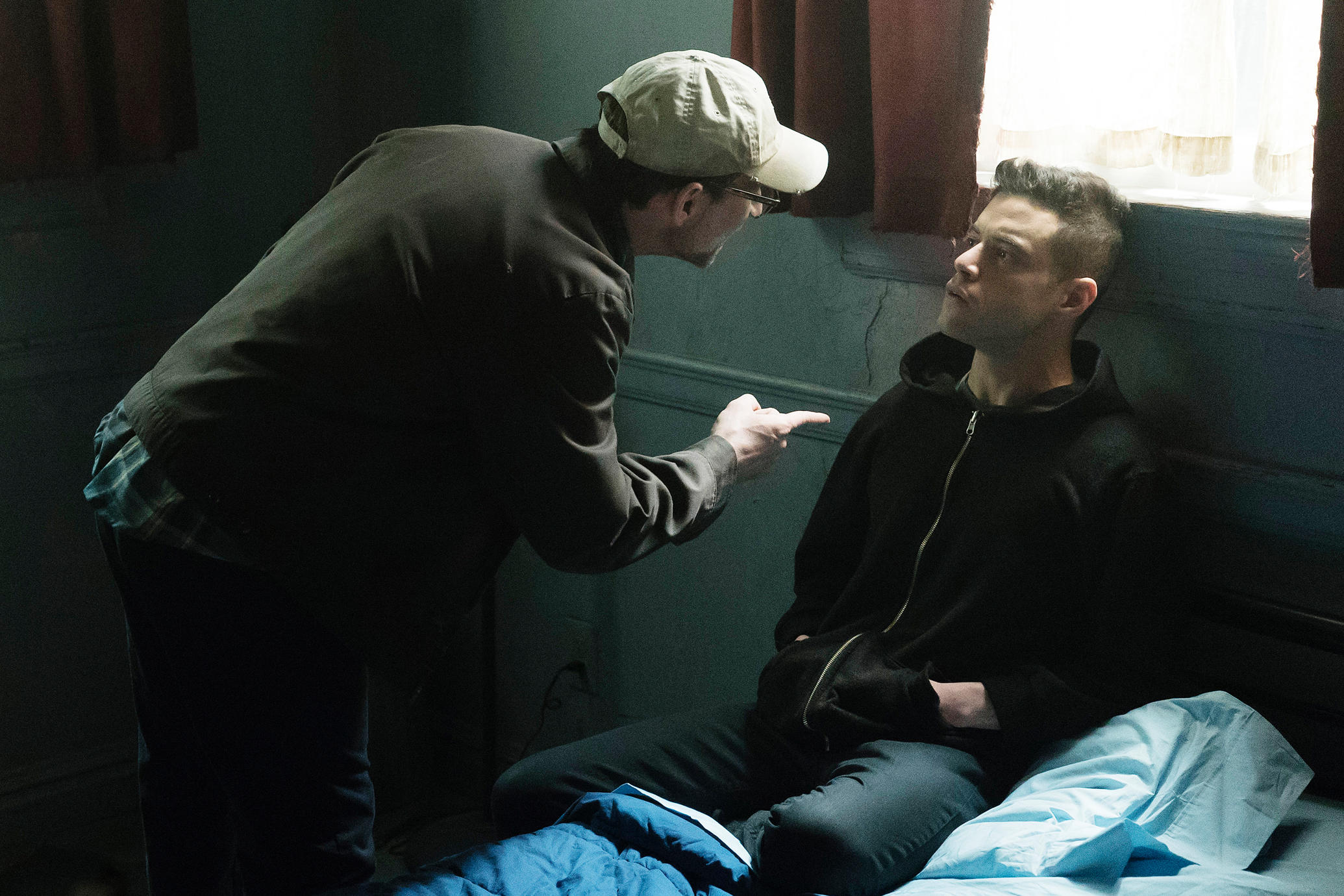Spoilers for the latest episode of Mr. Robot are ahead, so if you aren’t caught up with “Logic Bomb,” feel free to take care of that now. I’m fine waiting – I can use the time to hack the Washington Township Public Library.

For as much as I enjoyed the deliberate, meditative pace of the last few episodes of Mr. Robot, I found the frenetic, high-energy atmosphere of “Logic Bomb” to be a delightful change in pace. Perhaps this has something to do with the shorter time-slot tonight’s episode was working within (this is the first episode of the second season to have a run-time less than 60 minutes), and if this is the case, it’s not such a bad thing. While I enjoyed the slower scenes in earlier episodes (Angela’s dinner with Philip Price & Co. comes to mind), I also see the benefit in using a reduced run-time to tell a tighter, more cohesively-paced story.
Or, at least as cohesively-paced as a story like Mr. Robot can be. “Logic Bomb” exploded out of the chamber, shaking us out of the lull that the past few episodes eased us into. By the time the end credits roll, there are no less than four well-conceived cliffhangers in play: Dom is in the midst of a firefight while investigating E Corp’s China-based servers; f.society is planning a cyber attack on the FBI; Tyrell is much closer than we think; and Ray is capable of unspeakable cruelty and disregard for human life – including Elliot’s. If the first four episodes of the season set the table for what’s to come, then “Logic Bomb” was the commencement of Season 2’s main course. All the dangling cliffhangers from tonight’s episode will inevitably begin to weave together as we continue to move through the season, and rest assured in knowing that we’ve likely seen the last of the slow-burn episodes, for better or worse.
But I digress. Let’s get to it.
One of the most fascinating aspects of Season 2 is the ways in which we see our various characters straddling two very different worlds in terms of public persona and private self. It wasn’t so long ago that Angela was leveraging Price for a more prestigious title and office, but now that she’s seen Elliot again (presumably the first time since the 5/9 attack), her humanity seems to be returning. Her motives for deciding to help with the FBI attack are still unclear, though I would wager that self-interest is toward the top of the list of possibilities, but I can’t blame her if that’s the case, seeing as how the entire E Corp hack can be traced back to her by way of Ollie’s AllSafe computer. Regardless of her reasoning, the conversation with her and Elliot hearkened back to the bond they shared early in the series – back when she served as a pragmatic counterbalance to Elliot’s various neuroses.
The theme of public persona versus private self in “Logic Bomb” isn’t limited to Angela. With Ray, we not only saw his chummy, supportive facade begin to crumble – we saw it come crashing down. Ray sells himself as the man you can go to with your problems (he must be pretty good at it, too, seeing as how he got someone as skeptical and paranoid as Elliot to buy into his ruse); he’s the self-affirmed “positive reinforcement” guy, which is surely one reason why he seems to have gotten away with his deep web black market site for so long. Ray is quickly emerging as this season’s Big Bad, and it’s a credit to actor Craig Robinson for bringing such a weighty, complicated gravitas to a character that wouldn’t work if played by someone of lesser talent.
The theme can also be applied to Dianna Wellick, Agent DiPierro, and, most explicitly, Whiterose. It was quite unsettling to see Joanna coddling her baby while soliloquizing about the finer points of how a murder should be carried out (the jury is still out on whether it’s kinder to paralyze someone before killing them so that they may know their fate, or to just get it over and done with). DiPierro is (almost) as socially inept as Elliot is, and though she is good at her job, it’s only because it gives her something to hide behind instead of facing life head-on.
And then there’s the enigma that is Whiterose. As if the mysteries surrounding her as the head of the Dark Army weren’t enough, we learn in “Logic Bomb” that she is also China’s Minister of State Security (she presents as male in this persona, and is called Minister Zhang). With the many “faces” of Whiterose, it’s hard to know who her true private self is, though I would wager that the version we saw in last week’s episode (in which she asks her lover which earrings she should wear while also appearing vulnerable for the first time) was the truest. We’ll know the answer in full only when we see what Whiterose’s main objective is, and where her true allegiances are directed. One thing is for sure: with Whiterose being both the head of the Dark Army, as well as an important and influential minister of security, there’s no telling how high up this conspiracy goes. At the very, very least, we’re talking about the birth of a new world order.
We can also apply the theme of “Logic Bomb” to Elliot himself, but in his case, he’s still trying to figure out who he is and, more importantly, what he wants to live for. He has no public persona because he avoids public spaces, but he’s nonetheless learning to navigate within his own enclosed world. Most of this comes through the (misguided?) wisdom of Mr. Robot, who is still hell-bent on Elliot keeping his eyes on the prize; there’s still work to be done in finalizing the E Corp hack, not to mention the pesky business of getting the FBI off f.society’s trail.
For all of Elliot’s internal and external problems, it is his conscience that ultimately forms the core of his motivation. He follows his intuition about Ray (against Mr. Robot’s warnings) and finds out that the man he was so recently inspired to open up to happens to be the kingpin behind a dastardly deep web site that caters to drug, weapons, and human traffickers. Ray may be a bad dude, but at least he sees the value in diversification of services. The severe beating Elliot receives for looking where he shouldn’t, coupled with the scars that are surely to be left from the attack, might well serve as a reminder to him of what happens when one oversteps their bounds. But isn’t that what the spirit of Mr. Robot is all about? This is a show that places a very high value on the benefits of pushing back against the status quo, even when doing the right thing earns a severe ass-beating. Elliot is asking himself – and, by extension, asking us all – what makes life livable and fulfilling. It reminds me of the words of Socrates, spoken during his trial for corrupting the youth of Athens: The unexamined life is not worth living.
So who knows; maybe Elliot is our modern-day Socrates, pushing us to find value and purpose in our own lives even as he searches for value and purpose in his own.
5/5 stars: Elliot gets back behind the keyboard, and the hunt for f.society goes international. Mr. Robot has never been this exciting.



